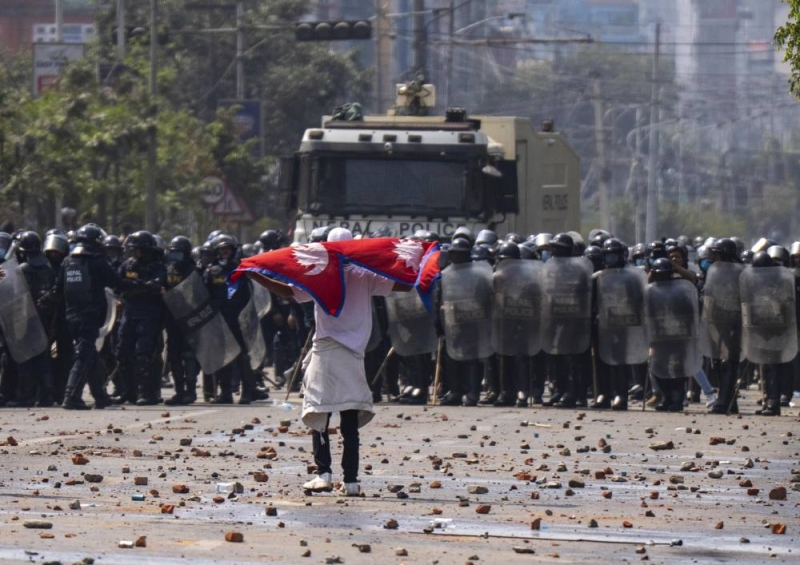On March 28, a large number of students were preparing for the seventh day of their Secondary Education Examination (SEE), also known as the 'iron gate'. On the same day, the pro-monarchy campaigners were all set to stage a mass demonstration in Tinkune area of the capital. Concurrently, the Socialist Front led by the Communist Party of Nepal (Maoist Centre) was preparing to counter the monarchists through a mass gathering at the bustling Bhrikuti Mandap area.
It was clear that two mutually exclusive political gatherings on the same day in the heart of Kathmandu were going to jeopardise the vehicular movement of the city. As every student appearing for the SEE does not have the luxury of an exam centre near their residence, the obvious agitation in the city was poised to impact them severely, both physically and mentally. Still the District Administration Office granted permission for the gatherings of two contending political groups.

It was apparent that the students appearing for the SEE were severely affected by the political gatherings on that day in Kathmandu. Moreover, the visual clips and still images of both the gatherings revealed even a sorry picture that is neglected by almost everyone. Young boys and girls of school-going age were seen wearing the badges of volunteers and managing the crowd in the gathering of the Socialist Font.
The visuals of young and vulnerable youngsters, most of them minors, prowling the Bhatbhateni Super Store amid the pro-monarchy demonstration were even gross. These are two recent incidents that demonstrate the approach of our political leaders towards the rights of children, which contradicts with the spirit of the United Nations (UN) Convention on the Rights of the Child (CRC). The CRC is an important agreement endorsed by countries, including Nepal, that have committed to protect children's rights.
Within 54 interconnected articles, the convention describes that a child is any person under the age of 18 years, and every child has the right to an education. In addition, no child should be forcibly and/or voluntarily dragged into politically-motivated gatherings and violent activities. Unfortunately, these directives of the UN convention were severely violated by the government, pro-monarchy activists and the Socialist Front on March 28.
These are not spontaneous and sporadic incidences of abuse of child rights in Nepal. Children were and are always considered as the easiest means to boost the participation in politically-motivated gatherings. Children are herded from their classrooms on will to the political gatherings to impress the guests.
There were few such controversial incidents during the Jhulaghat-Chiwa Bhanjyang march organised by the Communist Party of Nepal (UML) last year. Not only the CPN UML, other political parties have also known to follow similar trends during their mass gatherings. Down the timeline, child abuse was at its peak during the decade-long violent Maoists agitation.
Scores of students were abducted from the schools to join their so-called people's army. A few years back, a controversial and reprehensible statement made by Baburam Bhattarai, the head of the so-called 'People's Government', directing his subordinates to recruit and indoctrinate vulnerable children from western Nepal and prepare them to kill or be killed, had surfaced online. The young recruits, who were coerced into participating in the Maoist insurgency, continue to seek justice from both national and international legal authorities.
In a male and adult dominated society, children are mostly the suppressed group, be it at home, school or public place. Policymakers, political leaders and influential individuals are flagrantly violating the principles set forth by the CRC. Ironically, the children of powerful figures enjoy the privileges of childhood luxury, both within the country and abroad, while the children from the marginalised communities remain vulnerable and are frequently exploited as pawns in political protests and revolutions.
A child is the future of a country. A nurturing and supportive childhood fosters the development of a responsible and compassionate adult who can contribute positively to society. In contrast, an abusive and violent childhood often leads to the emergence of an adult marked by aggression, immorality and a flame of violence.
Unfortunately, the negligence of child rights by our leadership is shaping our children into disillusioned adults who, in turn, perpetuate the abuse they endured, passing it on to the next generation. Despite being a very important component for a country's prosperity, child right is a severely neglected issue in Nepal. Even during the agitation and vandalism on March 28, only faint voices denouncing the grave human right violation by the security forces are being heard.
The excessive force that the security forces used against the monarchists is condemnable and should be investigated by a high-level committee. Also, the issue of child right abuse during both political gatherings on that day should be investigated in the context of the disturbance of the SEE examination and participation of vulnerable minors in the political gatherings. Child right is a sensitive issue that should be strictly followed by a civilised and welfare society.
The grave child abuses that our children have suffered in the past should be retrospectively investigated, and the culprits should be brought to book. The government should implement strict regulations to follow the child rights as directed by the UN convention. A child does not belong to a political battleground or to a political gathering but to a safe and secure playground.
National and international human/child rights authorities must urgently address this overlooked issue and take meaningful steps to ensure that every child receives the innocuous childhood that they truly deserve. pushpa.joshi@gmail.
com.
Politics

Revolution and child rights: Gravely ignored issue

On March 28, a large number of students were preparing for the seventh day of their Secondary Education Examination (SEE), also known as the 'iron gate'. On the same day,...















